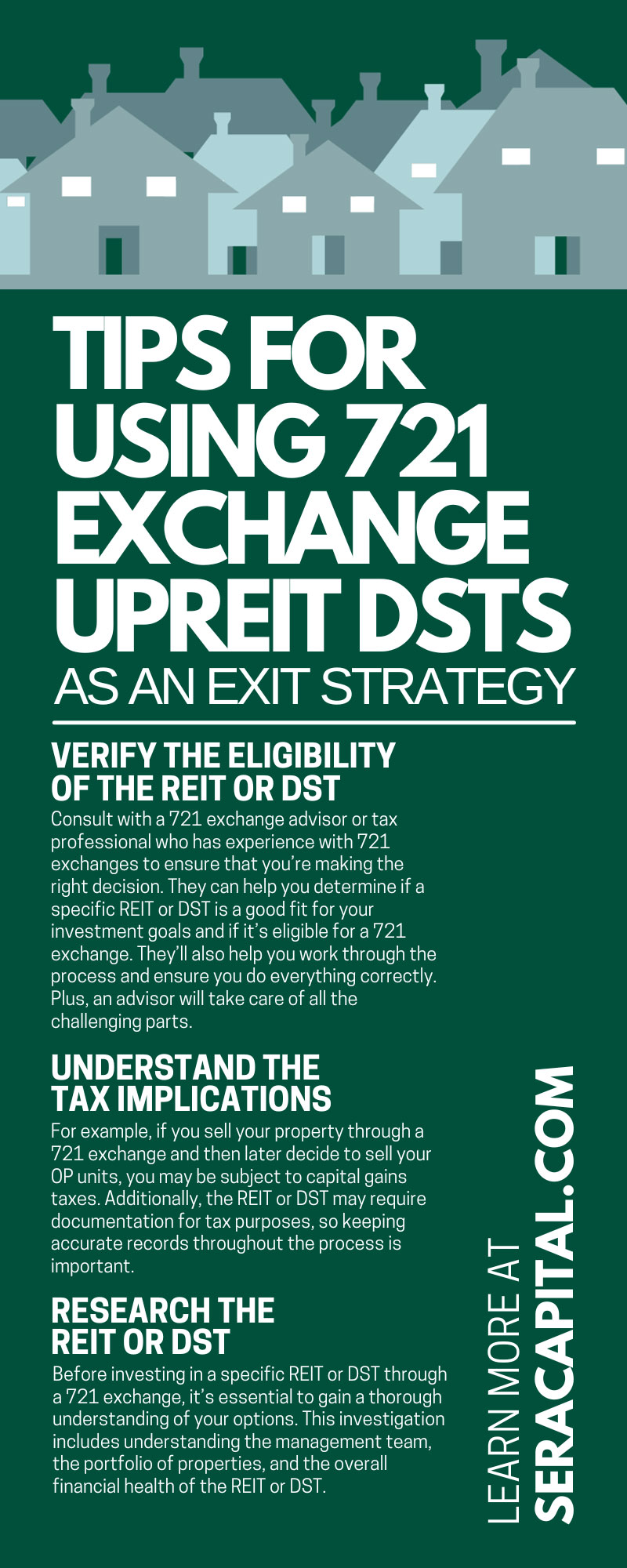Tips for Using 721 Exchange UPREIT DSTs as an Exit Strategy

Carl E. Sera, CMT
December 27, 2023
Are you considering using a 721 exchange UPREIT DST as an exit strategy? This move can be smart for investors transitioning from managing their own properties to selling their real estate investments. But as with any financial decision, it’s important to understand the process and potential pitfalls before moving forward. In this blog post, we’ll explore tips for effectively using 721 exchange UPREIT DSTs to achieve your investment goals.
What Is a 721 Exchange UPREIT DST?
Before diving into the tips, let’s first define a 721 exchange UPREIT DST. A 721 exchange allows investors to contribute their real estate investment, such as a rental property or commercial building, into a publicly traded real estate investment trust (REIT). The REIT then issues operating partnership units (OP units) in exchange for the contributed property. These OP units are essentially shares of the REIT and allow investors to retain ownership in the property without having to manage it themselves.
A Delaware Statutory Trust (DST) is a type of REIT commonly used in 721 exchanges. It offers several benefits for investors, including potential tax advantages and limited liability protection.
Now that we have a basic understanding of what a 721 exchange UPREIT DST is, let’s take a look at some tips for using it as an exit strategy.
Tip #1: Verify the Eligibility of the REIT or DST
Before initiating a 721 exchange, it’s essential to verify that the REIT or DST you’re considering is eligible for this type of transaction. Not all REITs or DSTs allow for 721 exchanges, and some may have specific requirements for the properties they accept. Additionally, your personal financial situation may also affect your eligibility for a 721 exchange.
Consult with a 721 exchange advisor or tax professional who has experience with 721 exchanges to ensure that you’re making the right decision. They can help you determine if a specific REIT or DST is a good fit for your investment goals and if it’s eligible for a 721 exchange. They’ll also help you work through the process and ensure you do everything correctly. Plus, an advisor will take care of all the challenging parts.
Tip #2: Understand the Tax Implications
As with any financial transaction, it’s crucial to understand the potential tax implications before moving forward. While a 721 exchange can offer tax benefits, such as deferring capital gains taxes, there may also be tax consequences to consider.
For example, if you sell your property through a 721 exchange and then later decide to sell your OP units, you may be subject to capital gains taxes. Additionally, the REIT or DST may require documentation for tax purposes, so keeping accurate records throughout the process is important.
Tip #3: Research the REIT or DST
Before investing in a specific REIT or DST through a 721 exchange, it’s essential to gain a thorough understanding of your options. This investigation includes understanding the management team, the portfolio of properties, and the overall financial health of the REIT or DST.
You should also consider the fees associated with investing in a REIT or DST. These may include upfront costs, ongoing management fees, and potential exit fees. Understanding these expenses can help you make an informed decision about whether a specific REIT or DST is right for you.
Tip #4: Be Aware of Potential Risks
As with any investment, there are potential risks associated with 721 exchange UPREIT DSTs. For example, the value of your OP units may fluctuate based on market conditions and the performance of the REIT or DST. It’s important to consider these risks carefully and ensure they align with your investment goals and risk tolerance.
Additionally, as mentioned earlier, there may be tax implications to consider both in the short-term and long-term. Make sure you understand these potential consequences before making a decision.
Tip #5: Consult With Professionals
As we’ve mentioned throughout this blog post, it’s crucial to consult with professionals who have experience with 721 exchange UPREIT DSTs. This meeting can include financial advisors, tax professionals, and real estate attorneys. These experts can help ensure that you’re making a well-informed decision and that you execute the transaction correctly.
Benefits of Using a 721 Exchange Exit Strategy
There are several advantages to using a 721 exchange UPREIT DST as an exit strategy. Explore some notable benefits below.
Diversification
You can diversify your real estate holdings by rolling your investment into a UPREIT DST. REITs often hold a variety of properties in different sectors and geographical locations, reducing the risk associated with owning a single property.
Access to Institutional-Quality Real Estate
Investing in a UPREIT DST offers the opportunity to own a share in institutional-quality real estate that may be otherwise out of reach for individual investors. This investment can include large-scale commercial properties, high-rise buildings, and other high-value assets.
No Direct Management Responsibilities
With a 721 exchange, you convert from direct property ownership to owning shares in a REIT. This conversion means you won’t have to handle the everyday tasks of property management, including maintenance, tenant issues, or rent collection.
Increased Liquidity
While direct real estate investment can be illiquid, shares in a REIT are much easier to buy and sell. This liquidity can increase your financial flexibility, particularly if you need to access your investment quickly.
Potential for Regular Income
REITs are required to distribute a high percentage of their taxable income to shareholders, usually in the form of dividends. This distribution can provide a stable income stream, which is particularly beneficial for investors seeking regular returns.
However, it’s vital to remember that while these benefits are attractive, a 721 exchange may not be the best fit for everyone. It’s crucial to consult with financial and tax professionals to determine if this strategy aligns with your overall investment goals and financial situation.
Final Thoughts
A 721 exchange UPREIT DST can be a useful tool for investors looking to exit their real estate investments without losing ownership in the property. However, it’s important to thoroughly understand the process before moving forward. A professional advisor can help you with anything you’re having a difficult time navigating. By verifying eligibility, understanding tax implications, being aware of potential risks, and consulting with professionals, you can make a well-informed decision about whether a 721 exchange UPREIT DST suits you.

Categories
Strategize Your Success
